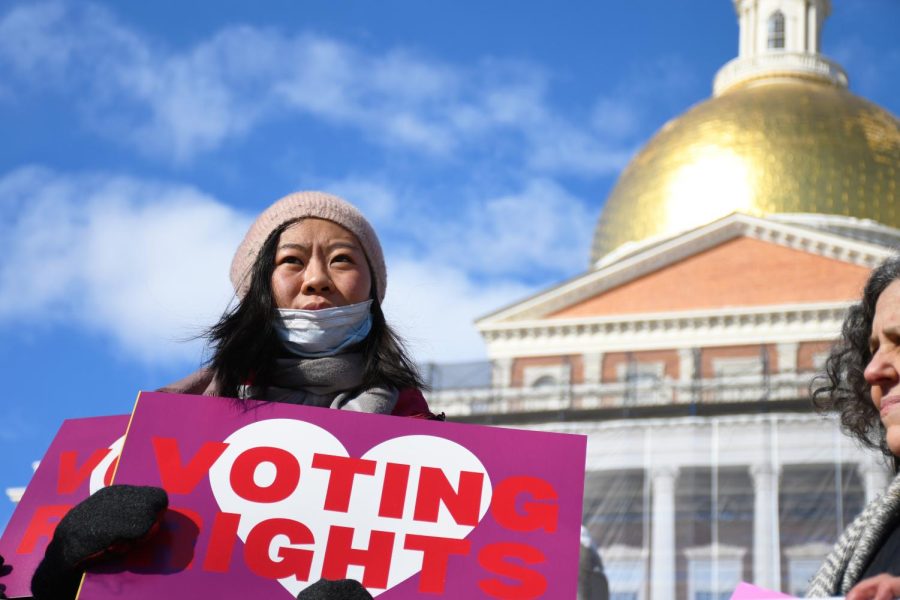Asian American voting rights activist mistaken for Michelle Wu, heckled at press conference
Massachusetts Voter Table Executive Director Beth Huang in an Election Modernization Coalition press conference Feb. 14. Huang was mistaken for Boston Mayor Michelle Wu and harassed by local man. Photo credit Avery Bleichfeld.
March 10, 2022
An unidentified heckler thought he was addressing Boston Mayor Michelle Wu when he yelled out during a press conference for same-day voting registration Feb. 14. In reality, he jeered at Beth Huang, the Chinese American executive director of the Massachusetts Voter Table, who he had mistaken for Wu outside of the Massachusetts State House.
“You’re a political puppet … Why don’t you look into it, Mayor Wu?” said the heckler, who was wearing a mask and sunglasses. “Look into that — you’ll find the truth, Mayor Wu.”
Huang said she was not upset by the heckling at the moment.
“It took me about 30 seconds to realize what was happening, but when I realized what was happening I wasn’t threatened because many people I worked with were nearby,” Huang said.
This incident was not a first for Huang — she said she has been mistaken for Boston’s new mayor before. In fact, Huang and Wu joked about the exchange on Twitter.
“If only being a 5’4’ Asian woman imbued in me the powers of being mayor of Boston,” Huang tweeted after the conference.
“We should make some good trouble with this ??

Although Huang did not find the individual heckling troubling, she said it follows the larger pattern of the racism and misogyny Wu has faced during her mayoral term. The heckler didn’t target Wu’s — and by mistake, Huang’s — Asian identity, but the confusion between the two women fits a longstanding stereotype that Asian people look alike.
“The thing that I’ve really learned about in the last week and a half is how much racism Wu has to deal with on a daily basis,” Huang said. “There’s a trope about [Asians] are all the same … [that] it’s less important to distinguish between Asian individuals because of these long-term stereotypes.”
Matthew Lee, a professor of human services and a researcher of Asian American identity, explained the impact of these stereotypes.
“It’s problematic for a number of reasons,” Lee said. “It normalizes ignorance of ethnic identity among the Asian community. The perceiver or perpetrator gets away with making these kinds of mistakes. Unless the perpetrators are held accountable for this kind of behavior they may commit it again.”
Although the aim of the press conference Huang rallied support for was derailed due to the incident, she said the heckling brought up another pressing issue of politics, in Boston and nationwide.
“It’s disturbing how anti-Asian sentiment has risen, especially during the COVID-19 pandemic, and I think it’s important for Asian Americans to unite with other people of color who have faced race-based oppression during this time,” Huang said. “We’re fighting for a multi-racial society where people are treated fairly and respectfully in ways that they deserve. We need to confront it because that kind of speech and behavior doesn’t have a place in a multi-racial society.”
Unlike the heckling towards Huang Feb. 14, other hecklers have targeted Wu with racist and sexist vitriol, prompting several Massachusetts elected officials, including Congresswoman Ayanna Pressley and Rep. Sonia Chang-Díaz, to release a statement Feb. 1 denouncing the hate against Wu.
“The relentless threats of violence and hateful attacks on Mayor Michelle Wu and her family have no place in our society and are a far cry from the political debate and peaceful dissent that is welcomed and necessary in a healthy democracy,” the elected leaders wrote in a shared statement from Pressley’s office.
Wu also filed an ordinance proposing a limit to residential picketing between 9 a.m. and 9 p.m. in response to the early-morning protests outside her Roslindale home. The demonstrations, which began early January at 7 a.m. in accordance with the current local noise ordinance, contain drums, whistles and chants, like “Shame on Wu!”
Wu has also been targeted over her policy requiring vaccines for city workers and at indoor establishments across Boston regarding her Asian identity — critics have called her “Mayor Wuhan” and alleged she is associated with the Chinese Communist Party.
“It’s not just against the policies but woven into the sentiment in these comments is this tinge of racism,” Lee said. “One of the common stereotypes a lot of Asians face is that we’re perpetual foreigners. No matter the work we put in, there are still people that will see us as foreign.”
The Asian American community of Greater Boston is familiar with this rhetoric. Maggie Yick, a senior at Malden High School, said she avoids anti-Asian content online.
“I didn’t read up on [the hate] because I didn’t want to read up on the Asian hate in our community,” Yick said. “I just hope people can acknowledge that Wu is trying to help us all.”
Huang said citizens should hold their elected officials accountable, but not to the level in which Wu has been facing protests. On top of that, Huang said she should not be confused with another person.
“In my opinion, it’s not uncalled for a person to call out to an elected official,” Huang said. “[But] that person should not have mistaken me for Michelle Wu.”







